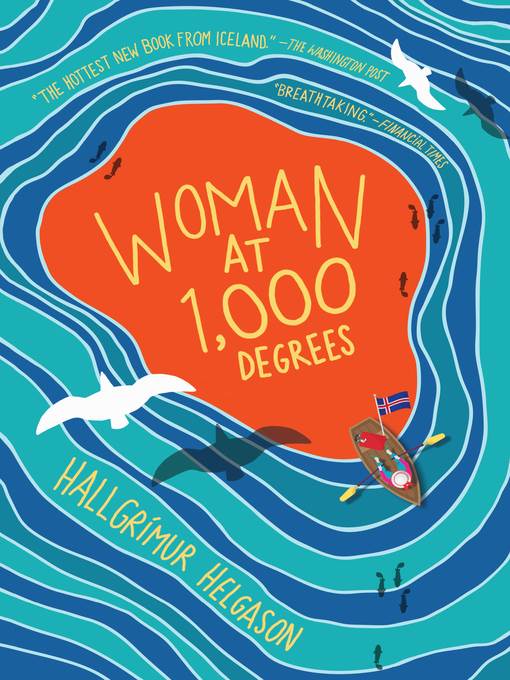
Woman at 1,000 Degrees
A Novel
کتاب های مرتبط
- اطلاعات
- نقد و بررسی
- دیدگاه کاربران
نقد و بررسی

November 1, 2017
This work by prolific Icelandic author and cartoonist Helgason is narrated by an 80-year-old woman dying of emphysema in a family member's garage. Typing on a laptop, she addresses the reader directly, telling the outlandish tale of the granddaughter of a president and daughter of a Nazi who was taken from Iceland to Germany before World War II, lived on several continents, and married numerous times. The story would have been more compelling if the author hadn't tried so desperately to shock the reader. Short chapters move between random years in the narrator's past and the present, in which she bemoans having to get up to use the bathroom and creates fake Facebook accounts to keep herself entertained. She applies the same ironic outlook to the world-shaking events and cultural shifts she's witnessed, claiming to be an uncredited pioneer of free love and women's liberation, among other things. VERDICT Despite the unusual, humorous premise, the voice feels inauthentic and the story drags on. Fans of whimsical novels or those interested in Icelandic settings may enjoy it. [See Prepub Alert, 8/2/17.]--Kate Gray, Boston P.L., MA
Copyright 2017 Library Journal, LLC Used with permission.

Starred review from October 30, 2017
Helgason’s sad and funny novel begins in 2009, as 80-year-old Herra Björnsson lies dying in a Reykavík garage, still in possession of a live hand grenade from World War II. Her limited activities of late include corresponding under a false identity with an Australian bodybuilder, arranging her own cremation, smoking, and recalling her eventful past. Abandoned by her father, Herra passes her first seven years with her mother and maternal grandmother on the Svefneyjar islands. Then her father reclaims his family and moves them to continental Europe, where he becomes one of the few Icelanders to enlist in Hitler’s forces. Herra and her mother take refuge with Herra’s paternal grandmother in Copenhagen but separate when Herra’s mother finds work in Lübeck and Herra is sent to the Frisian Islands. Before heading to the Eastern front, Herra’s father brings his daughter to Hamburg to reunite her with her mother, who never arrives. With-
out parents or papers, Herra suffers deprivation and indignity. Years later, as out of place in postwar Iceland as in war-torn Europe, Herra relocates to Argentina before again returning to Iceland. Her life encompasses four husbands, countless lovers, and a flirtation with John Lennon. In her unsentimental, unsparing narrative, she offers insights into Icelandic culture and character, including a riff on reticence and a brief summary of Iceland’s financial meltdown. Like the Icelandic landscape, she can be both appealing and treacherous.

December 15, 2017
An elderly woman looks back on a life permanently scarred by World War II in this latest from Icelandic novelist Helgason (The Hitman's Guide to Housecleaning, 2012, etc.).Reykjavik, 2009: 80-year-old Herra lives "alone in a garage, together with a laptop computer and an old hand grenade." The laptop enables her to flirt with a bodybuilder in Australia and keep track of her three sons. They don't visit much since she exited the nursing home they deemed appropriate for a woman with advanced emphysema and cancer. Herra doesn't entirely blame them, freely admitting she was a lousy mother who drank too much and never stayed with one man for long. She may be planning her own cremation (at the 1,000 degrees of the title), but Herra recalls her amorous adventures with zest even as she wisecracks, "Men have their uses, but quick witted they sure ain't." Herra, by contrast, is exceedingly quick-witted and has a wickedly colorful way with words (well-rendered into English by FitzGibbon). Only when her recollections increasingly focus on the war years do we see that her verbal relish overlies profound trauma. The hand grenade is a memento of her father, seduced into Nazism while studying Old Norse in Germany. His enlistment in the German army ultimately results in Herra finding herself alone in the Hamburg train station at age 12. Her account of three years fending for herself in war-ravaged Europe is so brutally gripping that it's a wrench to be yanked into the 1970s and the saga of Herra's marriage to the drunken, abusive Baering. The novel never really recovers after this. It lurches between the '80s and a postwar sojourn in Argentina that seems to belong in another book before returning with diminished impact to the denouement of Herra's wartime ordeal and her final present-day epiphany. Helgason's fragmented chronology, so effective at first, proves to lack an overarching architecture that would unify its vivid pieces.Brilliantly written with flashing insights, but an incoherent structure muffles its power.
COPYRIGHT(2017) Kirkus Reviews, ALL RIGHTS RESERVED.

November 1, 2017
Icelandic novelist Helgason shares with John Irving a knack for masterful plotting and clever, sarcastic humor, but he's distinctly darker in terms of character and mood. In this fictional memoir, 80-year-old Herra Bjornsson looks back on her life with bitter wit. Her feast of haunting deathbed memories spans much of the twentieth century, from bleakly powerful descriptions of Europe in WWII through vivid recollections of failed relationships. The time-frame shifts may trouble those more comfortable with a straightforward chronological approach, but anyone willing to follow the circuitous narrative journey and revel in its flights of language will find much to enjoy. Some of Herra's crass commentary may prove jarring or even offensive to some, but on her deathbedclutching a hand grenade and counting on making her crematorium appointmentshe is a grimly, often uncomfortably amusing old stick, but an undeniably unforgettable one.(Reprinted with permission of Booklist, copyright 2017, American Library Association.)

























دیدگاه کاربران